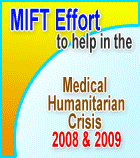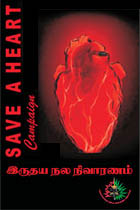Considering the request from the Humanitarian groups in Northeastern Sri Lanka, in January of 2003 the Medical Institute for Tamils made the decision to visit these areas and provide medical services, review the current status and to advise them on future health development. The Peace in Sri Lanka and the mandate given to the committee by the membership at the last Annual General Meeting, the Executive Committee requested that I organize a team comprising of doctors of different specialities, to go on a medical mission.
Miss. Nila Marilyn Figurado, Volunteer
The trip was planned and the team departed within six weeks, departing Canada on March 14th and reaching Colombo, Sri Lanka on March 16th, 2003. The team purchased the following in Colombo: a generator; dental compressor; pressure cookers (for sterilization); water filter; medical text books; various medications. The team donated the following items: amalgamator; cureing light; cavitron; dental instruments and dental material. These items were transported to Jaffna and the Vanni district, by Dr Figurado.
The team left for Jaffna on March 17th, and as organized, they met with the staff of the Faculty of Medicine, Jaffna and the Medical Students' Union. The team felt there were several shortages in the Jaffna hospital and medical school, particularly in the areas of qualified medical personnel, equipment and textbooks.
The medical team then left Jaffna for Kilinochchi reaching their destination around 5pm. Following a meeting with the health administrators and visiting the local hospital, the team left for Puthu Kudi Irupu, where they were well received and hosted in extreme comfort.
On March 18th the team commenced their clinical work at Puthu Kudi Irupu Hospital. They saw several patients, and provided consultations in surgery, dentistry, internal medicine, neurology, obstetrics-gynaecology, pain management and psychiatry. A few surgical procedures were also conducted that afternoon. Classes were held for medical students attached to the Vanni Medical School. Similar clinics were also held on March 19th, 20th and 21st.
On March 20th two members of the team visited a peripheral medical clinic Thillipan Centre at Ottisuttan. There are nine centres like this that are staffed by nurses who operate these clinics 24 hours a day, 365 days a year. They treat about 3000-3500 patients per month. The common illnesses treated in these clinics are diarrhoea, influenza, malaria, gastrointestinal problems and snake bites.
These centres function with minimal resources. They neither have proper equipment and medications, nor some of the basic facilities, including electricity. The MIFT team donated the necessary funds to install solar panels to provide electricity to these nine centres.
On March 19th the psychiatrists and the neurologist visited the Myuri Centre which houses 24 female residents who are either paraplegic or quadriplegic and a similar centre housing male residents. They also visited a few orphanages in the Puthu Kudi Irupu area on the same day.
Part of the team left for Kilinochchi on March 21st, to start work at Ponnampalam Memorial Hospital, and the rest of the team joined them the following day. The psychiatrists visited Vettrimannai which is about 20-25 km. from Kilinochchi. This is a residential placement centre for the mentally ill, which is situated in Skandapuram. They saw about 45 patients during their visit. They provided caregivers with advice on patient management during periods of relapse, and in the control of aggressive behaviour. The team continued their work in the Kilinochchi area until midday on March 23rd after which they left for Jaffna.
The team had initially planned to provide lectures at the Medical School in Jaffna, on both the 24th and 25th, but due to a miscommunication, the plans had to be dropped. On the 25th some members of the team met with the medical staff of Jaffna Hospital to discuss problems facing the hospital, and how MIFT of Canada may be able to assist in the future. Few of the members visited base hospitals in Mannar and Point Pedro on a fact finding mission.
The team returned to Colombo on the 26th of March. The next day they discussed ways and means of improving the rehabilitation process in the North and East, with the Minister of Rehabilitation for the Northern and Eastern Province, Mr. Jayalath Jayawardana, who hosted the team for tea.
On the 28th, the Canadian Ambassador, Ms. Valerie Raymond, invited the Canadian medical team for a luncheon in appreciation of their visit. They discussed the observations made by the team regarding healthcare shortages, and what role MIFT could assume in the future regarding this and other rehabilitation issues. The Canadian High Commissioner commended the pioneering effort made by MIFT and assured the High Commissions support of such Canadian medical missions in the future.
In conclusion, I would like to thank the team members and all those whose support helped make this mission a success.
-Dr. J. Rajendra
Mission Coordinator
































